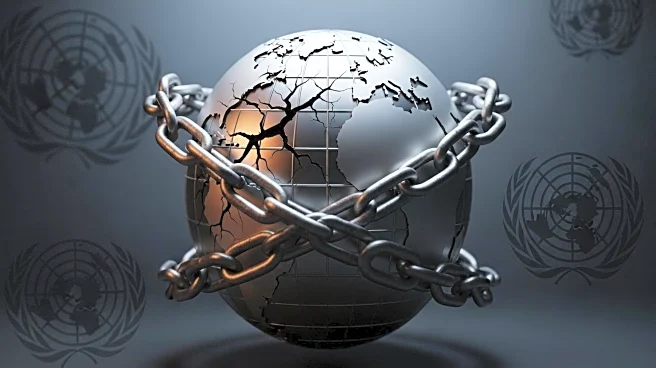What's Happening?
Iran is on the brink of facing renewed United Nations sanctions as the deadline for the 'snapback' mechanism approaches. This mechanism, part of the 2015 nuclear deal, allows for the reimposition of sanctions if Iran is found non-compliant. The deadline follows a declaration by France, Germany, and the United Kingdom that Iran is not adhering to the agreement. Since the U.S. withdrawal from the deal in 2018 under President Trump, Iran has restricted inspections by the International Atomic Energy Agency (IAEA) and has been involved in military confrontations with Israel, including the bombing of key nuclear sites. Iran's uranium enrichment has reached levels close to weapons-grade, raising concerns among Western nations.
Why It's Important?
The potential reimposition of U.N. sanctions on Iran could significantly impact its economy, which is already under strain. The sanctions would freeze Iranian assets abroad, halt arms deals, and penalize its ballistic missile program. This development is crucial as it could further destabilize the Middle East, especially amid ongoing tensions related to the Israel-Hamas conflict. The sanctions could also affect global oil markets, as Iran is a major crude oil supplier to countries like China. The geopolitical implications are vast, with potential shifts in alliances and increased pressure on Iran to comply with international nuclear standards.
What's Next?
Iranian leaders, including President Masoud Pezeshkian and Foreign Minister Abbas Araghchi, are making last-ditch efforts to prevent the sanctions during the U.N. General Assembly in New York. Diplomatic negotiations are expected to continue, with Iran seeking a resolution to avoid further economic isolation. If the 'snapback' sanctions are imposed, Iran may retaliate or escalate its nuclear activities, further complicating diplomatic relations with Western countries. The situation remains fluid, with potential interventions from major powers like China and Russia, who have historically supported Iran.
Beyond the Headlines
The reimposition of sanctions could lead to long-term shifts in Middle Eastern geopolitics, affecting U.S. relations with regional allies and adversaries. The situation highlights the complexities of nuclear diplomacy and the challenges of enforcing international agreements. It also underscores the delicate balance of power in the region, where military actions and economic sanctions are intertwined with diplomatic efforts.











